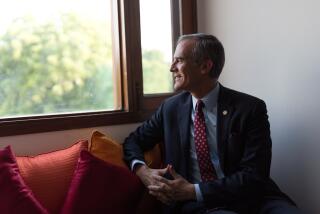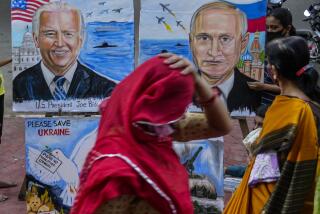Indian Leader Visits U.S. as Relations Falter
- Share via
NEW DELHI — As P. V. Narasimha Rao begins the official segment of his trip to the United States today, a bureaucrat here suggested how to ensure that the first visit to Washington by an Indian prime minister in seven years is a success.
“Talk trade,” the External Affairs Ministry official said. “Don’t talk security, nuclear weapons or non-proliferation.”
Indeed, the United States and India are so far apart on those important issues that it would hardly be a surprise if Rao, a cautious man who has been India’s leader since June, 1991, essentially does as the diplomat recommends.
An arms control initiative that Deputy Secretary of State Strobe Talbott peddled in India and Pakistan last month has foundered, leaving both countries groping for what to do next.
Few expect Rao to offer a solution when he addresses both houses of Congress today, and experts say there is virtually no chance of agreement on touchy issues such as non-proliferation when he meets President Clinton at the White House on Thursday.
Making the revival of Indo-American dialogue even more difficult is the U.S. conviction that the countries had a deal of sorts that Clinton Administration officials saw as ultimately lessening the danger of an Indo-Pakistani nuclear arms race.
Last September, according to the U.S. version of events, the Indians announced that they had agreed in principle to a multilateral disarmament conference on the Asian-Pacific region, with two weighty provisos--the mandate and the participants would have to be mutually agreeable.
But India later shot down a U.S. proposal outlining details of the conference.
Now, a U.S. diplomat said, the Indians have reverted to a “global or nothing” approach, which would link nuclear arms control or reduction by India and Pakistan to worldwide cuts the Americans think are impossible to achieve.
In practical terms, that killed the U.S. plan. It had called for the United States to lift an arms embargo to allow delivery of 38 F-16 jets to Pakistan. In exchange, Pakistan was supposed to agree to a verifiable “cap” on its nuclear program, including a cutoff of enriched uranium production.
But because Pakistani Prime Minister Benazir Bhutto’s government has been adamant that it won’t do anything India doesn’t agree to as well, New Delhi holds effective veto power over the plan.
The United States has been trying to broker a better security environment on the subcontinent out of fears that an Indo-Pakistani territorial dispute over Kashmir could escalate into a nuclear exchange.
The Indians call such concerns overblown and, while never admitting to have built nuclear weapons following the explosion of a “device” two decades ago, say their security equations need to take China into account as well.
“There is the unsettled border with Kashmir, with a proxy war going on, and an unsettled border with China. In both situations, you have a nuclear weapons state on the other side,” said Maj. Gen. Dipankar Banerjee, deputy director of the New Delhi-based Institute for Defense Studies and Analyses.
State Department spokesman Mike McCurry said Monday that Clinton expects his talks with Rao to cover a range of issues, including disputed topics such as proliferation, regional security and Kashmir, where there are widespread allegations of Indian human rights abuses against secessionist Muslim militants. But in a briefing for Indian reporters, a senior State Department official indicated that Clinton will not push India to change its positions.
More to Read
Sign up for Essential California
The most important California stories and recommendations in your inbox every morning.
You may occasionally receive promotional content from the Los Angeles Times.













